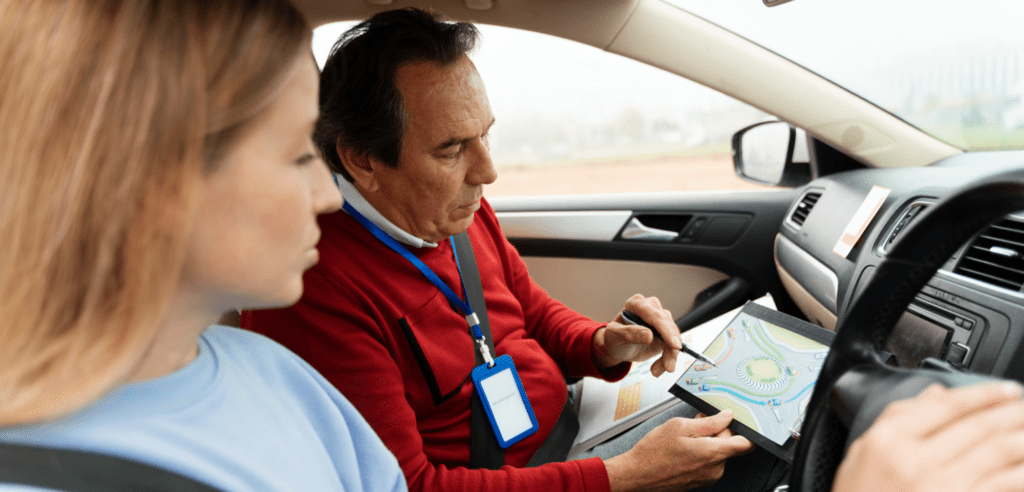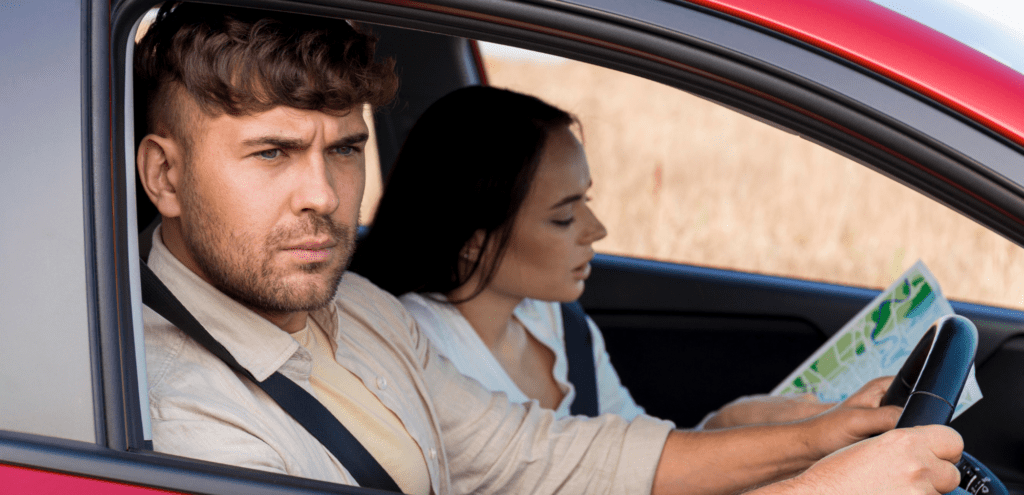
Making mistakes while driving is a common experience. Whether you’re a new driver lacking experience or a seasoned motorist who’s become a bit complacent, everyone is prone to errors now and then.
The main challenge lies in overcoming these mistakes without dwelling on the negative emotions they may bring. Here, we offer our best advice on how to move beyond these slip-ups and focus on improving your driving.
1. Learn from the Situation
Turning a driving mistake into a learning opportunity is the best approach for long-term improvement. Recognising and understanding your errors is the first step towards preventing them in the future.
This approach not only helps in rectifying the mistake but also aids in becoming a more adept driver.
Recognise and Reflect
It’s vital to acknowledge your mistake and pinpoint exactly what went wrong. This understanding forms the basis for devising a plan to avoid repeating the error, thereby converting the experience into a constructive lesson.
Practical Scenario
Many drivers might relate to the following example: You’re changing lanes and accidentally cut off another car because you failed to check your blind spot, despite looking in your mirrors.
This moment of negligence can cause immediate panic and serves as a stark reminder of the importance of thorough observation.

Immediate Response
The initial shock of such an incident naturally leads to a heightened state of alertness. The experience is far from pleasant, but it can instigate a more cautious and less complacent attitude towards driving.
By ensuring you always check your blind spot in future, you make the roads safer for everyone involved.
Positive Outcomes
Transforming a mistake into a positive outcome demonstrates a proactive approach to safe driving. For instance, in some jurisdictions, a driver caught speeding might be offered a speed awareness course instead of penalty points.
These courses are designed to provide a deep understanding of the consequences of one’s actions, promoting rehabilitation over punishment.
Such educational measures highlight the efficacy of learning from one’s mistakes to foster responsible driving habits.
2. Speak with Your Driving Instructor
Engaging with Your Instructor
If you’re in the process of learning to drive, communicating with your driving instructor can be incredibly beneficial. They possess a deep understanding of your driving skills and are equipped to offer tailored advice to enhance your performance in areas that require improvement.
Personalised Improvement Plans
Your instructor can devise custom strategies that focus specifically on your weaknesses, ensuring a more effective learning experience. This approach allows for targeted improvements, making your practice sessions more productive.

Understanding the Learning Process
It’s crucial to recognise that making errors during your lessons is a normal aspect of the learning journey. Your instructor will reassure you that experiencing setbacks is a common and expected part of acquiring new skills.
After all, the safety of a controlled learning environment makes it the optimal setting for overcoming these challenges.
3. Stop with the ‘What If’s
Recognising the Impact of Hypothetical Scenarios
Engaging in ‘what if’ scenarios, such as pondering the presence of a child, friend, or parents in the car during an incident, or speculating on the reactions of other drivers, can lead to unnecessary stress.
While it’s important to acknowledge mistakes made while driving, dwelling on potential outcomes that did not occur is unproductive.
Shifting Your Perspective
Instead of succumbing to negative thoughts, try to focus on positive outcomes. Take a moment to practice deep breathing and remind yourself of the fortunate reality: the quick reactions of others prevented harm, and everyone remained safe.
Emphasizing these positive aspects can help alleviate anxiety and promote a healthier mindset moving forward.
4. Embarrassment is Temporary
Understanding the Fleeting Nature of Mistakes
Embarrassment following a mistake, especially while driving, is a common feeling. However, it’s essential to recognize that such feelings are temporary.
When you make a minor mistake on the road, it’s likely that other road users will have forgotten about it within a short period.
Interactions on the road are brief, and while your error might momentarily frustrate other drivers, they are likely to move past it quickly.
Perspective from Other Road Users
Considering the situation from another driver’s perspective can be helpful. Think about how you would react to seeing someone else make a similar error.
Whether it’s getting into the wrong lane, failing to signal on time, or stalling, your initial reaction might be annoyance or concern, especially if the mistake nearly led to an accident.
However, like most people, you would likely discuss the incident with friends and then let it go. This demonstrates the transient nature of these experiences and how quickly we move on from them.

Overcoming Shame with Support
For some learner drivers, the shame of making a mistake can be overwhelming, to the point where they dread facing their driving instructor again. It’s crucial to remember that making mistakes is a part of the learning process.
Driving instructors are well aware of this and are prepared for learners to have mishaps. They are not fixated on past errors but are focused on helping you improve.
Your instructor’s primary goal is for you to learn from the mistake and demonstrate improvement. Concentrating on mastering driving skills is far more productive than dwelling on embarrassment.
With time, the mistake will fade from memory, emphasizing the importance of moving forward and focusing on your progress.
5. Remember, You’re Not Alone
Everyone Makes Mistakes
It’s easy to believe that you’re the only person who makes mistakes, especially when it comes to driving. However, if you talk to any driver, they will likely share their own experiences of errors they’ve made, whether big or small.
Some may have been involved in serious accidents, while others might recall minor incidents like reversing into a bollard or scratching another car’s paintwork.

The Reality of Forgetting Mistakes
If someone claims they’ve never made a mistake while driving, they’re probably not being entirely truthful, or they have managed to move past their errors to such an extent that they no longer remember them.
Making mistakes is a normal part of life and is particularly common when you’re learning something new, like driving.
Learning Amongst Friends
As a learner driver, you should expect to make plenty of mistakes, and that’s perfectly normal. You’re in good company, surrounded by people who have been through similar experiences.
If you find driving challenging, remember that there are many practical solutions and strategies that can help you improve.
You’re not alone in this journey, and there’s a community of drivers and instructors ready to support you through the learning process.
6. Feel the Feelings
Acknowledging Your Emotions
It’s entirely normal to experience negative emotions after committing a mistake while driving. Whether you feel anxious, guilty, or even a bit foolish, these reactions are a typical response to recognising you’ve done something incorrect. Suppressing these emotions or denying their existence isn’t a healthy way to cope.
Managing Emotional Responses
The challenge lies in not allowing these feelings to overwhelm you or deter you from driving again. It’s crucial to get back into the driver’s seat as soon as you can, to prevent these negative emotions from lingering.
If your confidence has taken a hit, consider having a trusted person accompany you during your next drive. This can help ease the tension and provide a supportive environment.

Seeking Additional Support
For those who have already obtained their driving licence but still feel uncertain, scheduling a refresher lesson or two is a wise option.
A professional driving instructor can offer the reassurance and guidance needed to boost your confidence on the road.
This step can be particularly beneficial in reinforcing your driving skills and ensuring that you feel comfortable and secure behind the wheel.
7. Speak with an Expert
Seeking Professional Guidance
Some driving mistakes lead to serious accidents, causing harm to others and leaving you with significant emotional distress.
In such cases, moving past the incident might be challenging without a robust support network, which should ideally include professional assistance.

Initiating the Process
It’s advisable to make an appointment with your GP to discuss the impact of the accident on your mental well-being. Your doctor can offer guidance, potentially prescribe medication, or refer you to a mental health specialist.
Given that waiting times for NHS services can be lengthy, it’s prudent to seek help promptly.
Exploring Private and Community Support Options
If circumstances allow, exploring private therapy could provide you with the support you need more swiftly. However, if private therapy is not within your means, there are still numerous mental health resources available.
Organisations like MIND can direct you to suitable support services. Additionally, the Samaritans offer round-the-clock support with trained volunteers ready to listen to your concerns; you can contact them for free at 116 123.
For those who prefer writing, emailing the Samaritans can be an alternative, with a guaranteed response within 24 hours. This range of options ensures that there’s support available, regardless of your situation or preferences.


